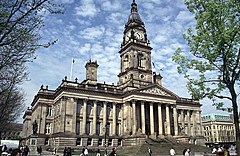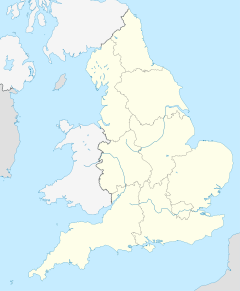Bolton (Greater Manchester)
| Bolton | ||
|---|---|---|
| Bolton Town Hall | ||
| Coordinates | 53 ° 35 ′ N , 2 ° 26 ′ W | |
|
|
||
| Residents | 139,403 (as of 2001 Census ) | |
| administration | ||
| Post town | BOLTON | |
| ZIP code section | BL1-BL7 | |
| prefix | 01204 | |
| Part of the country | England | |
| region | North West England | |
| Metropolitan county | Greater Manchester | |
| Metropolitan Borough | Bolton | |
| British Parliament |
Bolton North East Bolton South East Bolton West |
|
Bolton is a town in metropolitan county Greater Manchester in England in the valley of the River Croal . Bolton was part of Lancashire until 1974 ; since then it has been the administrative seat of the Metropolitan Borough of Bolton . The city had around 139,000 inhabitants in 2001.
history
The history of Bolton goes back to the Bronze Age . The first documentary evidence dates back to 1067 and records a Manor of Bolton in Bolton-le-Moors. Bolton and the surrounding area were part of the Crown after the Normans invaded in 1066 . Later the land between the River Mersey and the River Ribble, west of Manchester, was given to a Baron Roger de Poictou by William the Conqueror . Later it came back to the Crown, then to Ranulf de Briscasar, 3rd Earl of Chester and then to Roger de Maresy . Most of the families who owned the Bolton Estate belonged to the home of the Earl of Derby .
The place received in 1261 by Heinrich III. the royal charter which gave her market rights. Bolton had already been raised to a borough by William de Ferrers, 5th Earl of Derby , together with the right to hold a market.
In 1337 Flemish weavers settled in Bolton and set up spinning mills , weaving mills and a wooden shoe production facility. From this a textile industry developed over time ; Cotton was first processed in 1641.
In 1516 the still existing private school Bolton School was founded.
Bolton was a center of Puritanism in the 17th century and a bastion of parliamentarians in the English Civil War , surrounded by areas close to the royalists. On May 28, 1644 Bolton was attacked by an army of 10,000 men from Ruprecht von der Pfalz under the leadership of the Earl of Derby. 1500 people were killed and 700 were taken prisoner. This event is known as the Bolton Massacre .
The invention of spinning machines such as the Spinning Jenny (by James Hargreaves 1761) and the Spinning Mule by the Bolton-born Samuel Crompton in 1779 enabled a significant qualitative and quantitative increase in textile production and Bolton can thus be regarded as one of the starting points of the industrial revolution . A statue in Bolton, built in 1862, is dedicated to Samuel Crompton. The first machine spinning mill was opened in Bolton in 1780. In 1838 the places Little Bolton and Great Bolton were united on both sides of the River Croal. Bolton had about 47,000 inhabitants at that time. In the same year Queen Victoria granted Bolton borough status . As early as May 29, 1828, the Bolton and Manchester Railway began its railway operations ; on July 1, 1828 follow the Bolton to Leigh Railway , which was operated by George and Robert Stephenson . At this time, numerous sub-contractors for the British coal mines settled in Bolton; there were also other industries such as paper production .
In 1899 an electric tram was put into operation, which was replaced by buses in 1928. In 1929 there were 247 cotton mills in Bolton; in the 1950s there were 103, in 1964 34, and in 1979 only 8.
Museums
- Bolton Museum - Museum of History, Archeology, Art and Local History with one of the oldest public aquariums in Britain
- The Bolton Steam Museum - collection of historic steam engines
Sports
Bolton Wanderers football club plays in Football League One.
Since 2009 the Ironman UK has been held in and around Bolton every year in August . In this triathlon over the Ironman distance, the athletes have to cover 3.86 km of swimming, 180.2 km of cycling and 42.195 km of running.
sons and daughters of the town
- Thomas Cole (1801–1848), American landscape painter
- Robert Whitehead (1823–1905), designer of the first self-propelled torpedo
- Thomas Moran (1837-1926), American painter
- David Jack (1898-1958), football player
- Eric Bentley (1916–2020), cultural critic, author, singer and translator
- Nat Lofthouse (1925-2011), football player
- Ronald Pickvance (1930–2017), art historian
- Fred Dibnah (1938–2004), chimney builder and TV presenter
- Shaun Greenhalgh (* 1960), art forger
- Andrew Oldcorn (* 1960), professional golfer
- Paul Pritchard (* 1967), climber, mountaineer and author
- Diane Morgan (* 1975), actress and comedian
- Danny Jones (* 1986), singer and guitarist in the British band McFly
- Amir Khan (* 1986), boxer
- Luke Daniels (* 1988), football player
- Matthew Rotherham (* 1994), cyclist and paracycling pilot
- Nathaniel Phillips (born 1997), football player
- Will Jääskeläinen (* 1998), Finnish football goalkeeper
literature
- James Christopher Scholes: History of Bolton: With Memorials of the Old Parish Church . With illustrations. Edited and completed by William Pimblett. Publisher: The Daily Chronicle office 1892
- Bolton History - British history online
- David Hall: Worktown: The Astonishing Story of the Project that launched Mass Observation . London: Weidenfeld, 2015
Web links
- town workhouse was built in Fletcher Street in Bolton in around 1810
- Samuel Crompton in Bolton
- HICK, HARGREAVES & CO. LTD, ENGINEERS AND MILLWRIGHTS, SOHO WORKS, BOLTON
- The legacy of Lord Leverhulme
- SMITHILLS HALL - English Heritage
- HALL I TH WOOD - English Heritage
- MARKET HALL AND ALL GROUND FLOOR SHOPS - English Heritage
- ASTLEY BRIDGE MILL - English Heritage
- SWAN LANE MILL NUMBER 3 - English Heritage
- Heritage steam hammer moves home

